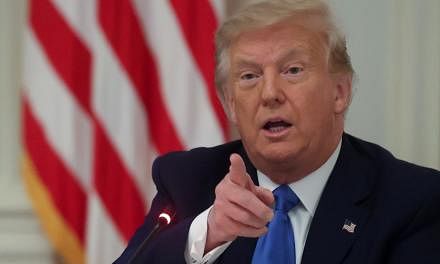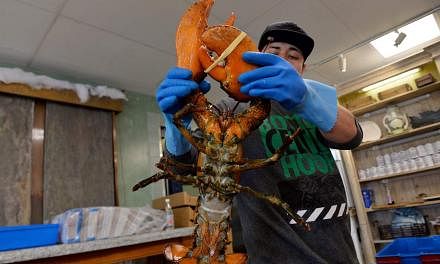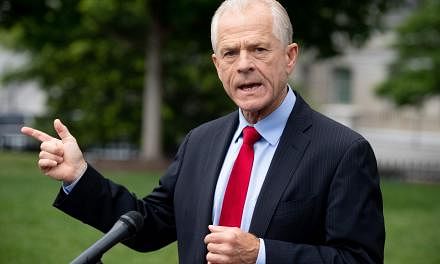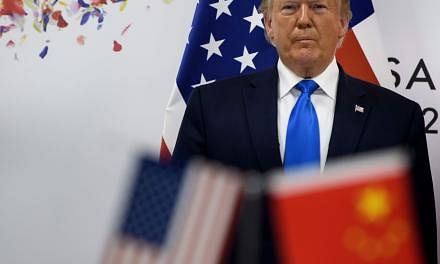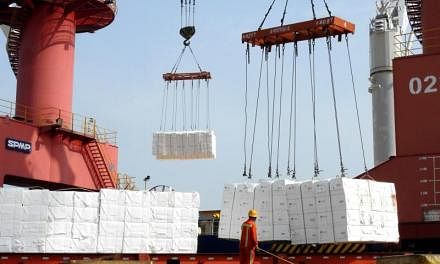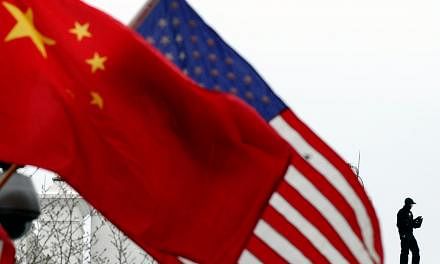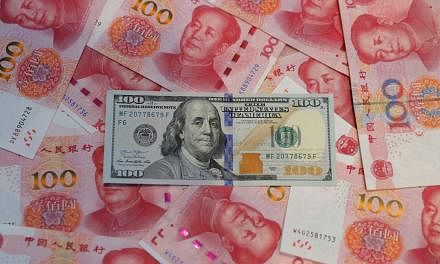WASHINGTON/BEIJING (BLOOMBERG, REUTERS) - China Vice-Premier Liu He will still travel to the United States this week for trade talks, but will shorten his trip, South China Morning Post reported on Monday (May 6), citing an unnamed source briefed on the latest plans.
The Hong Kong newspaper said Mr Liu is now expected to leave Beijing on Thursday, three days later than previously scheduled, and leave Washington a day later.
The Wall Street Journal had reported earlier that China was considering cancelling this week's trade talks in light of comments by US President Donald Trump.
Mr Trump on Sunday raised pressure on Beijing to strike a trade deal by announcing he would increase tariffs on US$200 billion (S$272 billion) of Chinese imports to 25 per cent from 10 per cent on Friday. He also floated the possibility of extending a new 25 per cent duty on another US$325 billion in imports that are not now covered.
"Risks of a full blown trade war are escalating," said Mr Chua Hak Bin, a senior economist at Maybank Kim Eng Research in Singapore. "Trump's threat may backfire, as China will not want to negotiate with a gun pointing at their heads."
China's yuan plunged the most in more than three years and its equity markets roiled as markets unwound bets on a resolution to a trade war that has weighed on global commerce and forced companies to rethink supply chains. The Aussie dollar fell while the yen climbed.
LENGTHY TALKS
Mr Liu, China's top trade envoy, was to arrive in Washington with a delegation of about 100 people for what had been shaping up to be possibly the final round of negotiations.
But Mr Hu Xijin, editor-in-chief of China's Global Times newspaper, said on Monday that Mr Liu is "very unlikely" to go to the US this week after Mr Trump's threat.
"Let Trump raise tariffs. Let's see when trade talks can resume," Mr Hu said in a tweet. Global Times is a tabloid published by the ruling Communist Party's People's Daily.
US Trade Representative Robert Lighthizer and Treasury Secretary Steven Mnuchin visited Beijing last week for talks they described as productive.
The US had been targeting Friday to announce a deal, that would be finalised and signed by Mr Trump and Chinese President Xi Jinping later at an official summit, people familiar with the negotiations said last week.
The two sides have been locked in intense negotiations since last year for an agreement to address US concerns over China's trade surplus, alleged theft of intellectual property and forced technology transfers.
Mr Trump and Mr Xi agreed to a tariff truce on Dec 1 to allow their senior negotiators time to come up with an agreement.
The truce helped soothe investors' concerns about a further escalation in a trade war between the world's two largest economies, which imposed tariffs on about US$360 billion of each other's goods last year.
Mr Trump's latest tweets on the tariff increase marked an abrupt reversal in stance for the White House after both sides said for weeks that negotiations were going well.
'A WARNING'
That shift reflects growing US frustration with China's backpedalling on some of its earlier commitments, including on the crucial matter of technology transfer, two people familiar with the situation said. That has emboldened trade hawks within the Trump administration to push for a harder line, including the raising of tariffs, the people said.
The Wall Street Journal earlier reported that China was mulling a cancellation of the next round of talks after Mr Trump's tweet.
The journal said Beijing was surprised by Mr Trump's threat to levy new tariffs on trade with the country, citing a person it didn't identify. The country doesn't want to negotiate under threat, the newspaper said.
White House economic adviser Larry Kudlow said on Fox News that the President was "issuing a warning". While "great progress" has been made in the talks, structural and enforcement issues remained, he said.
"We hope they'll come around with this deal, but if they don't, the President is saying 'Guess what, the tariffs will remain,'" Mr Kudlow said.
BUCKLE UP
Major US stock indexes had been trading at or near record highs, in part on optimism that the US and China would soon put their bruising trade war in the rear-view mirror.
"This has all the makings of a complete disaster that could lead the stock market to crater," Mr Chris Rupkey, chief financial economist at MUFG Union Bank in New York, said in a note Sunday to clients. "Buckle up your seat belt, investors."
Mr Trump imposed duties of 25 per cent on an initial US$50 billion of Chinese goods last year and then 10 per cent on an additional US$200 billion in products in September.
Those duties were set to rise to 25 per cent on Jan 1 and then again on March 1, but Mr Trump delayed that as talks continued.
China has imposed tariffs on US$110 billion of US exports in retaliation for the earlier duties.
Based on calculations by Bloomberg Economics, tariffs at the current level add up to a 0.5 percentage-point drag on China's gross domestic product growth this year.
An increase to 25 per cent tariffs on US$200 billion in Chinese exports from 10 per cent would raise the drag to 0.9 percentage point. Tariffs on all of China's exports to the US would increase the burden to 1.5 point.
Mr Trump also said on Sunday that tariffs paid by China "are partially responsible for our great economic results," although economic studies have shown it's the companies that import Chinese goods and US consumers, not China itself, that pay the bulk of the additional costs.
The conflict has already contributed to a slump in global trade, dented business confidence and forced companies to upend their supply chains.
The International Monetary Fund cut its global outlook last month to the slowest pace since the financial crisis, warning that an escalation in tariffs could push growth even lower.


